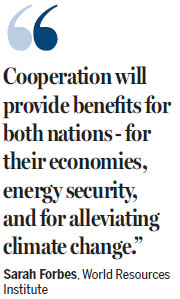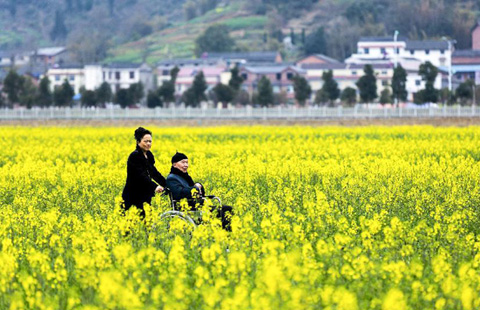Climate pact offers improved relations
Updated: 2015-02-23 13:03
By Paul Welitzkin in New York(China Daily USA)
|
||||||||
The drive for a global climate-change agreementby the end of 2015 offers the best scenario to improve US-Chinese relations, according to observers.
The goal of cleaner air and water has both nations trying new things and cooperating on research and development to help both economies rely less on fossil fuels, said Melanie Hart, director for China policy at the Center for American Progress
"Climate change represents the best opportunity to deepen US-China relations," she told China Daily. .
"I believe there is a tremendous opportunity for the US and China to cooperate on climate change," said Sarah Forbes, senior associate at the World Resources Institute in an interview. "Cooperation will provide benefits for both nations - for their economies, energy security, and for alleviating climate change."
Countries at the Ad Hoc Working Group on the Durban Platform for Enhanced Action agreed earlier this month in Geneva to a draft text for a deal to fight climate change. Considered a key development toward an agreement that may be adopted in Paris by the end of the year, the text is an updated version of a draft from a December conference in Lima, Peru.
The US-China initiative on climate change got a major boost last November when US President Barack Obama and Chinese leader Xi Jinping unveiled an action plan on greenhouse emissions as part of an historic pact. The US agreed to reduce carbon emissions by 26-28 percent by 2025 and China committed to no growth in carbon emissions in 2030 according to Hart.
Just because of their size and economic footprint, Hart said the US and China will play pivotal roles in developing a global climate change agreement.
"The US is the biggest emitter of emissions among the developed countries and China is the biggest emitter among the developing economies," said Hart. "Both countries are critical for success but both must also act in a leadership role on this issue."

Coal is a good example of how China and the US can cooperate as both countries depend on the fuel to fulfill much of their energy needs. Even though the US and China are making progress in using alternative fuels such as natural gas and solar and wind energy, coal still represents an important part of both nations' economies.
In 2010, a US-China coal research consortium led by West Virginia University (WVU) was unveiled. It is focused on progress in clean coal and carbon-capture technology development.
Earlier this month, the university's College of Law hosted a public educational event - China, Climate Change and the West Virginia Connection. It featured Jerry Fletcher, professor of resource economics and director ofthe university's US-China Energy Center and Forbes of the World Resources Institute.
The Friends of Blackwater's Allegheny Highlands Climate Impacts Initiative and the law college's s Center for Energy and Sustainable Development sponsored the event.
In addition to developing power plants that run on alternative fuels, Forbes said developments in carbon capture and storage (CCS) - a technology that can capture up to 90 percent of the carbon dioxide (CO2) emissions produced from the use of fossil fuels like coal - will be critical for both nations.
"CCS will probably wind up contributing 14 percent of the solution in a plan for cutting CO2 emissions," she said.
Fletcher said there are differences in how China and the US use coal. "The US chemical industry is mostly petroleum based while China's is mostly coal based. Still the move to reduce CO2 through increased efficiency and storage technology provides a way for both countries to work together."
But he cautioned that the process is just beginning.
"This is a first step. You have to learn how to walk before you can run. And whatever methods are employed to reduce greenhouse gas emissions, it will add to the cost of energy. This will be a challenge that both nations will need to confront," he said.
paulwelitzkin@chinadailyusa.com
(China Daily USA 02/23/2015 page1)
- Planning for the future family as society ages
- Ratings of China's Spring Festival gala hit new low
- Rail modernizations civilize Spring Festival travel rush
- Thousands affected by SW China earthquake
- Discipline watchdog names 855 for violations during holidays
- Nursing home killer in fury over unpaid wages

 Texas Lunar Festival fun
Texas Lunar Festival fun
 Stars arrive at 87th Academy Awards
Stars arrive at 87th Academy Awards
 'God of Wealth' promotes US pears
'God of Wealth' promotes US pears
 Man's best friend: border soldiers and a military dog
Man's best friend: border soldiers and a military dog
 Couple sentries guard China's northern border during traditional holiday
Couple sentries guard China's northern border during traditional holiday
 Another winter storm to pummel eastern United States
Another winter storm to pummel eastern United States
 2015 Film Independent Spirit Awards
2015 Film Independent Spirit Awards
 Beautiful sceneries of early spring flowers around China
Beautiful sceneries of early spring flowers around China
Most Viewed
Editor's Picks

|

|

|

|

|

|
Today's Top News
Savoring benefits of medicinal foods
Alejandro G. Inarritu wins Best Director for 'Birdman'
Chinese enjoy shopping, massages and travel to ring in New Year
Foreign minister to preside at UN
Innovation bright spot as economy slows down
Ballet appreciated as form of valuable cultural exchange
Climate pact offers improved relations
Four Chinese among top 100 for Mars One project
US Weekly

|

|







